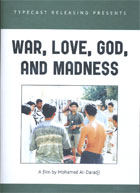
War, Love, God, and Madness 2010
Distributed by Typecast Releasing, 3131 Western Ave., Suite 514, Seattle, WA 09121; 206-322-0882
Produced by Mohamed Al-Daradji
Directed by Mohamed Al-Daradji
DVD, color, 83 min.
Sr. High - Adult
Iraq, War, Middle Eastern Studies, Human Rights
Date Entered: 04/22/2011
Reviewed by Gary Handman, University of California BerkeleyMaking an independent film is, even in the most salutary cases, almost always a perilous undertaking, a broken-field hurdle over economic, technical, and human obstacles and constraints. Making an independent film in the midst of a country blown apart by war, terrorism, violent sectarian strife, and political repression is unimaginable. In War, Love, and Madness, filmmaker Mohamed Al-Daradji (who is a dual Iraqi and Dutch citizen) provides an astonishing and harrowing chronicle of doing just that. Using a combination of cinema vertité and first-person narrative, the film documents Al-Daradji and his intrepid crew as they frantically attempt to cast and shoot Al-Daradji's feature film, Ahlaam (Dreams), in and around Baghdad. I have not seen the feature (finally released in 2006, and currently available on home video), but I can't imagine it could be more riveting or emotionally engaging than this exceptional documentary.
Al-Daradji's cinematic forays move across a surreal, war-torn urban landscape: streets littered and cratered by car bomb explosions; endless, ominous check-point crossings; American helicopters, like vultures, swooping overhead incessantly. Fear and the threat of sudden violence and death are almost palpable on these streets. And even more surreal is the fact that the sources of this violence become increasingly difficult to determine as Al-Daradji's story unfolds: Terrorists? The local militias? The government? The occupying Americans? In a sense, it doesn't really matter. Al-Daradji's crew with their cameras and dangerously high visibility are caught firmly in the cross-fire. There are incredibly moving segments in this film. One of the Al-Daradji's actors talks matter-of-factly about being tortured in Abu Ghraib. Another crew member shows signs of progressively worsening post-traumatic stress syndrome and drops out of the project. (He's haunted by the lexical irony that if you remove the first Arabic letter from the word "war", it becomes "God"; if you remove the middle letter, it becomes "Love"). A drunk who wanders into the film shoot sings a poignant popular song, "Don't blame me when I scream, for I have lost my family." Al-Daradji gives him a bit part in the film. The stress of shooting under these conditions eventually begin to wear the director down, and he considers scrubbing the project, abandoning his dream. And just when things couldn't get any more dire, they do. During a film shoot, pandemonium breaks loose. Gunfire erupts; three crew members are kidnapped and tortured (by whom?); one is shot in the leg. They are eventually handed over to the U.S. military, accused of making films for Al-Qaeda, and tortured again. All three are eventually released, but 20% of the film's sound is lost. But the film does, miraculously, get made and screened in 2006—the first narrative feature made in Iraq for over thirteen years.
I can think of few other films that I've seen in the past ten years that are as effective as War, Love, God, and Madness in conveying the power of artistic vision, commitment, and drive. I can also think of few as effective in conveying the disasters of war and its toll on the lives of everyday people.
Highly recommended.